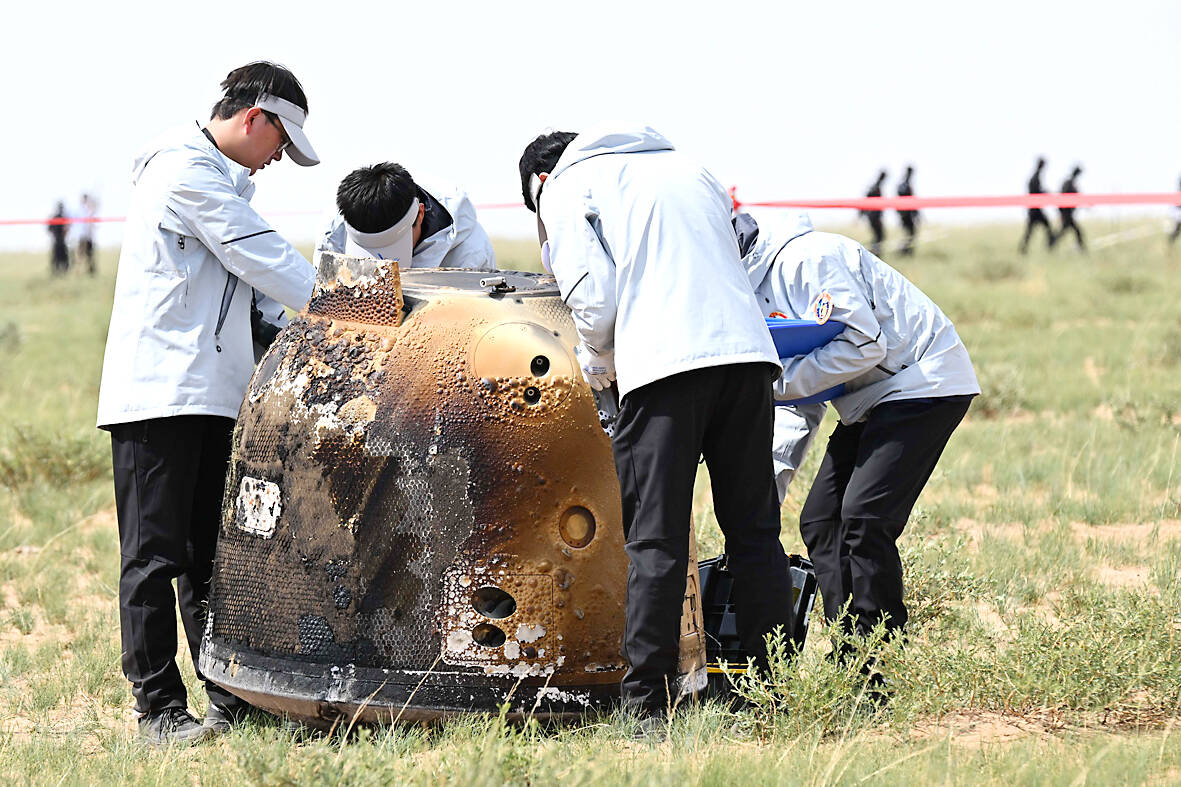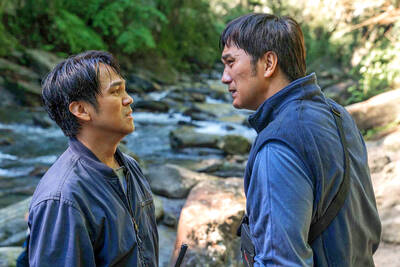A historic lunar mission has demonstrated China’s growing scientific prowess, but the feat has set off a torrent of misinformation targeting the US that researchers say reflects their bitter competition in space.
China is celebrating the return of the Chang’e 6 probe to Earth on Tuesday bearing rock-and-soil samples from the little-known far side of the Moon, following a 53-day mission that reignited old conspiracy theories about NASA’s Apollo Moon landings.
AFP’s fact-checkers have debunked a litany of Chinese-language posts suggesting NASA’s historic mission in 1969 — that first landed humans on the Moon — was staged as well as posts misrepresenting decades-old photos from subsequent landings.

Photo: EPA-EFE
The falsehoods, researchers say, risk stoking anti-US perceptions in China amid already fraught relations between Washington and Beijing, as the superpowers engage in an intensifying space race.
“There is undeniably a great power rivalry in space between the US and China, and any kind of misinformation about the activities by either country is concerning,” said Saadia Pekkanen, from the University of Washington. “It is yet another way that the potential for space diplomacy can be negated in the geopolitical competition between the two countries.”
When China’s National Space Agency released a photo of a stone-made Chinese flag erected on the Moon’s far side by Chang’e-6 in early June, users on Twitter (X) compared it with an image of NASA astronaut Harrison Schmitt standing next to a US flag on the lunar surface in 1972.
Posting to tens of thousands of followers, they falsely suggested the Apollo 16 mission must have been staged because Schmitt’s cloth flag was pictured being “blown” by the wind — despite NASA’s explanation that it used a horizontal bar to hold it upright.
‘INSECURITY’
Posts comparing the images on China’s Weibo platform attracted a flood of comments, with one user with more than 13 million followers writing that the photos proved that “Americans did not land on the Moon.”
Other users shared a photo of the German band Rammstein dressed as astronauts with their helmets off, with one sarcastic caption on Weibo reading: “Now you believe that the US moon landing was real.”
Decades-old photos from NASA’s Apollo missions in the late 1960s and early 1970s have also been recycled by social media users claiming they were actually from China’s groundbreaking lunar mission.
Beijing has poured huge resources into its space program over the past decade in a bid to close the gap with the US and Russia.
China aims to send a crewed mission to the Moon by 2030 and plans to build a base on the lunar surface, while the US is also planning to put astronauts back on the Moon by 2026 with its Artemis 3 mission. It was not clear whether the misinformation was fueled by Chinese state-backed actors, but the rapid spread on tightly controlled social networks has raised questions about their possible support or involvement.
“Beijing sometimes lets anti-American sentiments and false information run rampant on the Chinese internet, to allow for an escape valve for domestic tensions, and to modulate Chinese citizens’ views,” Isaac Stone Fish, chief executive of China-focused data company Strategy Risks, told AFP.
“Allowing conspiracy theories on the US moon landing to fester may reflect insecurity on Beijing’s part on the space race between China and the United States.”
‘SPREAD A LIE’
Researchers say the misinformation campaign suggests a frequent tactic of recycling existing conspiracy theories to sow online distrust.
“There is large online community that is happy to talk about the moon landing conspiracy,” said Darren Linvill, from Clemson University. “If this audience can be harnessed to spread a lie that puts China in a more positive light, that is all the better for China.”
Chinese state media coverage strongly praising the Chang’e-6 probe’s success has simultaneously been critical of the US. Washington has warned that Beijing’s space program is being used to mask military objectives and an effort to establish dominance in space.
The nationalist Global Times newspaper reported that the Chang’e-6 mission demonstrated China’s “open and inclusive attitude toward international cooperation” in contrast to the US, which it said was “busy chanting the ‘China threat’ in a so-called space race.”
Against this backdrop, AFP debunked Chinese-language posts on Facebook, Weibo, TikTok and its Chinese sister app Douyin quoting the White House press secretary as saying that the US and China landed on “different moons” after being asked why the Chang’e-6 found “no traces” of NASA’s mission. The exchange was entirely fabricated.
“Chinese people can be justifiably proud of their lunar module’s historic trip to collect samples,” Stone Fish said.
“They don’t need to fall victim to the old conspiracy theory that the US has staged moon landings.”

March 24 to March 30 When Yang Bing-yi (楊秉彝) needed a name for his new cooking oil shop in 1958, he first thought of honoring his previous employer, Heng Tai Fung (恆泰豐). The owner, Wang Yi-fu (王伊夫), had taken care of him over the previous 10 years, shortly after the native of Shanxi Province arrived in Taiwan in 1948 as a penniless 21 year old. His oil supplier was called Din Mei (鼎美), so he simply combined the names. Over the next decade, Yang and his wife Lai Pen-mei (賴盆妹) built up a booming business delivering oil to shops and

Indigenous Truku doctor Yuci (Bokeh Kosang), who resents his father for forcing him to learn their traditional way of life, clashes head to head in this film with his younger brother Siring (Umin Boya), who just wants to live off the land like his ancestors did. Hunter Brothers (獵人兄弟) opens with Yuci as the man of the hour as the village celebrates him getting into medical school, but then his father (Nolay Piho) wakes the brothers up in the middle of the night to go hunting. Siring is eager, but Yuci isn’t. Their mother (Ibix Buyang) begs her husband to let

The Taipei Times last week reported that the Control Yuan said it had been “left with no choice” but to ask the Constitutional Court to rule on the constitutionality of the central government budget, which left it without a budget. Lost in the outrage over the cuts to defense and to the Constitutional Court were the cuts to the Control Yuan, whose operating budget was slashed by 96 percent. It is unable even to pay its utility bills, and in the press conference it convened on the issue, said that its department directors were paying out of pocket for gasoline

On March 13 President William Lai (賴清德) gave a national security speech noting the 20th year since the passing of China’s Anti-Secession Law (反分裂國家法) in March 2005 that laid the legal groundwork for an invasion of Taiwan. That law, and other subsequent ones, are merely political theater created by the Chinese Communist Party (CCP) to have something to point to so they can claim “we have to do it, it is the law.” The president’s speech was somber and said: “By its actions, China already satisfies the definition of a ‘foreign hostile force’ as provided in the Anti-Infiltration Act, which unlike